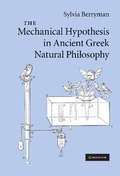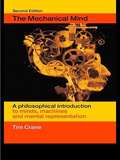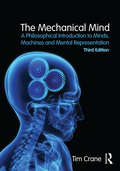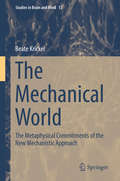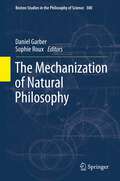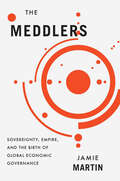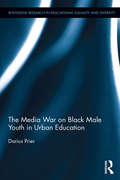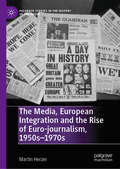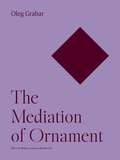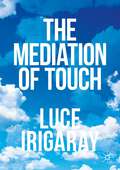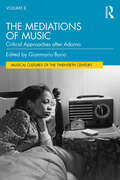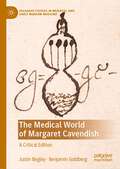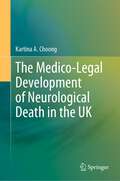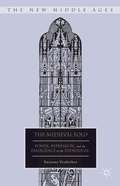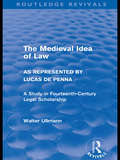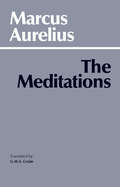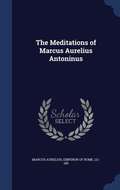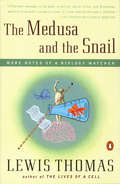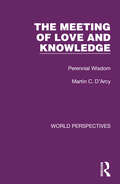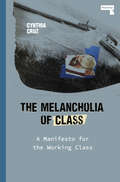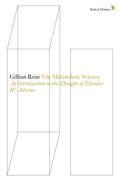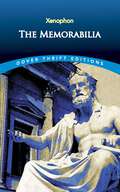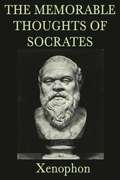- Table View
- List View
The Mechanical Hypothesis in Ancient Greek Natural Philosophy
by Sylvia BerrymanIt has long been thought that the ancient Greeks did not take mechanics seriously as part of the workings of nature, and that therefore their natural philosophy was both primitive and marginal. In this book Sylvia Berryman challenges that assumption, arguing that the idea that the world works 'like a machine' can be found in ancient Greek thought, predating the early modern philosophy with which it is most closely associated. Her discussion ranges over topics including balancing and equilibrium, lifting water, sphere-making and models of the heavens, and ancient Greek pneumatic theory, with detailed analysis of thinkers such as Aristotle, Archimedes, and Hero of Alexandria. Her book shows scholars of ancient Greek philosophy why it is necessary to pay attention to mechanics, and shows historians of science why the differences between ancient and modern reactions to mechanics are not as great as was generally thought.
The Mechanical Mind
by Tim CraneThis edition has been fully revised and updated, and includes a new chapter on consciousness and a new section on modularity. There are also guides for further reading, and a new glossary of terms such as mentalese, connectionism, and the homunculus fallacy.
The Mechanical Mind: A Philosophical Introduction to Minds, Machines and Mental Representation
by Tim CraneHow can the human mind represent the external world? What is thought, and can it be studied scientifically? Should we think of the mind as a kind of machine? Is the mind a computer? Can a computer think? Tim Crane sets out to answer these questions and more in a lively and straightforward way, presuming no prior knowledge of philosophy or related disciplines. Since its first publication, The Mechanical Mind has introduced thousands of people to some of the most important ideas in contemporary philosophy of mind. Crane explains the fundamental ideas that cut across philosophy of mind, artificial intelligence and cognitive science: what the mind-body problem is; what a computer is and how it works; what thoughts are and how computers and minds might have them. He examines different theories of the mind from dualist to eliminativist, and questions whether there can be thought without language and whether the mind is subject to the same causal laws as natural phenomena. The result is a fascinating exploration of the theories and arguments surrounding the notions of thought and representation. This third edition has been fully revised and updated, and includes a wholly new chapter on externalism about mental content and the extended and embodied mind. There is a stronger emphasis on the environmental and bodily context in which thought occurs. Many chapters have been reorganised to make the reader's passage through the book easier. The book now contains a much more detailed guide to further reading, and the chronology and the glossary of technical terms have also been updated. The Mechanical Mind is accessible to anyone interested in the mechanisms of our minds, and essential reading for those studying philosophy of mind, philosophy of psychology, or cognitive psychology.
The Mechanical World: The Metaphysical Commitments of the New Mechanistic Approach (Studies in Brain and Mind #13)
by Beate KrickelThis monograph examines the metaphysical commitments of the new mechanistic philosophy, a way of thinking that has returned to center stage. It challenges a variant of reductionism with regard to higher-level phenomena, which has crystallized as a default position among these so-called New Mechanists. Furthermore, it opposes those philosophers who reject the possibility of interlevel causation. Contemporary philosophers believe that the explanation of scientific phenomena requires the discovery of relevant mechanisms. As a result, new mechanists are, in the main, concerned solely with epistemological questions. But, the author argues, their most central claims rely on metaphysical assumptions. Thus, they must also take into account metaphysics, a system of thought concerned with explaining the fundamental nature of being and the world around it. This branch of philosophy does indeed matter to the empirical sciences. The chapters investigate the nature of mechanisms, their components, and the ways in which they can bring about different phenomena. In addition, the author develops a novel account of causation in terms of activities. The analysis provides the basis for many further research projects on mechanisms and their relations to, for example, the mind-body problem, realization, multiple realization, natural kinds, causation, laws of nature, counterfactuals, and scientific levels.
The Mechanization of Natural Philosophy
by Dan Garber Sophie RouxThe Mechanisation of Natural Philosophy is devoted to various aspects of the transformation of natural philosophy during the 16th and 17th centuries that is usually described as mechanical philosophy .Drawing the border between the old Aristotelianism and the « new » mechanical philosophy faces historians with a delicate task, if not an impossible mission. There were many natural philosophers who actually crossed the border between the two worlds, and, inside each of these worlds, there was a vast spectrum of doctrines, arguments and intellectual practices. The expression mechanical philosophy is burdened with ambiguities. It may refer to at least three different enterprises: a description of nature in mathematical terms; the comparison of natural phenomena to existing or imaginary machines; the use in natural philosophy of mechanical analogies, i.e. analogies conceived in terms of matter and motion alone.However mechanical philosophy is defined, its ambition was greater than its real successes. There were few mathematisations of phenomena. The machines of mechanical philosophers were not only imaginary, but had little to do with the machines of mecanicians. In most of the natural sciences, analogies in terms of matter and motion alone failed to provide satisfactory accounts of phenomena.By the same authors: Mechanics and Natural Philosophy before the Scientific Revolution (Boston Studies in the Philosophy of Science 254).
The Meddlers: Sovereignty, Empire, and the Birth of Global Economic Governance
by Jamie MartinA pioneering history traces the origins of global economic governance—and the political conflicts it generates—to the aftermath of World War I. International economic institutions like the IMF and World Bank exert incredible influence over the domestic policies of many states. These institutions date from the end of World War II and amassed power during the neoliberal era of the late twentieth century. But as Jamie Martin shows, if we want to understand their deeper origins and the ideas and dynamics that shaped their controversial powers, we must turn back to the explosive political struggles that attended the birth of global economic governance in the early twentieth century. The Meddlers tells the story of the first international institutions to govern the world economy, including the League of Nations and Bank for International Settlements, created after World War I. These institutions endowed civil servants, bankers, and colonial authorities from Europe and the United States with extraordinary powers: to enforce austerity, coordinate the policies of independent central banks, oversee development programs, and regulate commodity prices. In a highly unequal world, they faced a new political challenge: was it possible to reach into sovereign states and empires to intervene in domestic economic policies without generating a backlash? Martin follows the intense political conflicts provoked by the earliest international efforts to govern capitalism—from Weimar Germany to the Balkans, Nationalist China to colonial Malaya, and the Chilean desert to Wall Street. The Meddlers shows how the fraught problems of sovereignty and democracy posed by institutions like the IMF are not unique to late twentieth-century globalization, but instead first emerged during an earlier period of imperial competition, world war, and economic crisis.
The Media War on Black Male Youth in Urban Education (Routledge Research in Educational Equality and Diversity)
by Darius PrierNews media, film, and the music industry have become powerful sources of misrepresentation of Black male life in the social imagination of white society. The pedagogy of popular culture has important implications for educators and youth advocates who desire to challenge the myths and distortions that ultimately harm youth. This volume raises awareness of the media war on Black male youth in popular culture, and the impact this image battle has on the discriminatory treatment of the population in urban educational settings. Citing the recent controversial deaths of Trayvon Martin and Jordan Davis, the portrayal of black males in contemporary films, and the locus of hip-hop masculinities, this volume offers a unique framework for analyzing how contemporary image-making practices affect Black male youth in urban education. It also offers ethical considerations for educators in their critique, consumption and reading of Black male subjectivity in media, and provides avenues for practical applications of critical media literacy on the ground.
The Media, European Integration and the Rise of Euro-journalism, 1950s–1970s (Palgrave Studies in the History of the Media)
by Martin HerzerThis book explains how the media helped to invent the European Union as the supranational polity that we know today. Against normative EU scholarship, it tells the story of the rise of the Euro-journalists – pro-European advocacy journalists – within the post-war Western European media. The Euro-journalists pioneered a journalism which symbolically magnified the technocratic European Community as the embodiment of Europe. Normative research on the media and European integration has focused on how the media might help to construct a democratic and legitimate European Union. In contrast, this book aims to deconstruct how journalists – as part of Western European elites – played a key role in elite European identity building campaigns.
The Mediation of Ornament (The A. W. Mellon Lectures in the Fine Arts #38)
by Oleg GrabarHow ornamentation enables a direct and immediate encounter between viewers and art objectsBased on universal motifs, ornamentation occurs in many artistic traditions, though it reaches its most expressive, tangible, and unique form in the art of the Islamic world. The Mediation of Ornament shares a veteran art historian’s love for the sheer sensuality of Islamic ornamentation, but also uses this art to show how ornament serves as a consistent intermediary between viewers and artistic works from all cultures and periods. Oleg Grabar analyzes early and medieval Islamic objects, ranging from frontispieces in Yemen to tilework in the Alhambra, and compares them to Western examples, treating all pieces as testimony of the work, life, thought, and emotion experienced in one society. The Mediation of Ornament is essential reading for admirers of Islamic art and anyone interested in the ways of perceiving and understanding the arts more broadly.
The Mediation of Touch
by Luce IrigarayThe first communication between human beings, the one between the newborn and the mother, happens through touch. Strangely this first way of relating to each other has barely been considered by our education and our culture, which have favoured sight to the detriment of touch. And yet touching and being touched means experiencing ourselves as living beings. For lack of such a touch, we do not perceive the limits nor the sensitive potential of our bodies. Then we remain immersed in a natural or a cultural universe, incapable of reaching our own individuation and of knowing our fundamental difference from the other(s).Desire, in particular sexuate desire, is a call for touching one another anew. But this touch requires us to have gained our autonomy and to be able to open up to and commune with the other as transcendent to ourselves while staying in ourselves. This book unveils and explores how touch can act as a basic living mediation in love and,more generally, in our comprehensive individual and collective human becoming. It also considers how touch can contribute to founding a culture respectful of difference instead of subjecting them to an ideal of sameness. We need touch as mediation to fulfil our humanity and to build a truly human thinking and world.
The Mediations of Music: Critical Approaches after Adorno (Musical Cultures of the Twentieth Century)
by Gianmario BorioAdorno believed that a circular relationship was established between immediacy and mediation. Should we now say that this model with its clear Hegelian influence is outdated? Or does it need some theoretical integration? This volume addresses these questions by covering the performance of music, its technological reproduction and its modes of communication – in particular, pedagogy and dissemination through the media. Each of the book’s four parts deal with different aspects of the mediation process. The contributing authors outline the problematic moments in Adorno’s reasoning but also highlight its potential. In many chapters the pole of immediacy is explicitly brought into play, its different manifestations often proving to be fundamental for the understanding of mediation processes. The prime reference sources are Adorno’s Current of Music, Towards a Theory of Musical Reproduction and Composing for the Films. Critical readings of these texts are supplemented by reflections on performance studies, media theories, sociology of listening, post-structuralism and other contiguous research fields.
The Medical World of Margaret Cavendish: A Critical Edition (Palgrave Studies in Medieval and Early Modern Medicine)
by Benjamin Goldberg Justin BegleyThis book is the first transcription and extensive commentary on a fascinating but almost entirely overlooked manuscript compilation of medical recipes and letters, which is held in the University of Nottingham. Collected by the Marquess and Marchioness of Newcastle, William and Margaret Cavendish, during the 1640s and 1650s, this manuscript features letters of advice, recipes, and sundry philosophical and medical reflections by some of the most formidable and influential physicians, philosophers, and courtly scholars of the early seventeenth century. These include “Europe’s physician” Theodore de Mayerne, the adventurer and courtier Kenelm Digby, and the natural philosopher, poet, and playwright Margaret Cavendish. While the transcription and accompanying annotations will allow a diverse array of readers to appreciate the manuscript for the first time, the introduction situates the Cavendishes’ recipe collecting habits, medical preoccupations, natural philosophical views, and politics within their social, cultural, and philosophical contexts, and draws out some of the most significant implications of this important document.
The Medicean Succession
by Gregory MurryIn 1537, Florentine Duke Alessandro dei Medici was murdered by his cousin and would-be successor, Lorenzino dei Medici. Lorenzino's treachery forced him into exile, however, and the Florentine senate accepted a compromise candidate, seventeen-year-old Cosimo dei Medici. The senate hoped Cosimo would act as figurehead, leaving the senate to manage political affairs. But Cosimo never acted as a puppet. Instead, by the time of his death in 1574, he had stabilized ducal finances, secured his borders while doubling his territory, attracted an array of scholars and artists to his court, academy, and universities, and, most importantly, dissipated the perennially fractious politics of Florentine life. Gregory Murry argues that these triumphs were far from a foregone conclusion. Drawing on a wide variety of archival and published sources, he examines how Cosimo and his propagandists successfully crafted an image of Cosimo as a legitimate sacral monarch. Murry posits that both the propaganda and practice of sacral monarchy in Cosimo's Florence channeled preexisting local religious assumptions as a way to establish continuities with the city's republican and renaissance past. In "The Medicean Succession," Murry elucidates the models of sacral monarchy that Cosimo chose to utilize as he deftly balanced his ambition with the political sensitivities arising from existing religious and secular traditions.
The Medico-Legal Development of Neurological Death in the UK
by Kartina A. ChoongDiagnosis of death by neurological criteria (DNC) is a construct which has been part of the British medico-legal landscape for nearly half a century. This book examines the factors behind its emergence, and discusses the various changes that took place in the last few decades that culminated in the current definition and clinical criteria for determining brain-based death. It highlights the continuities and discontinuities in practice, and the impact they have on the issue of withdrawal of mechanical ventilation in intensive care units and on the field of organ transplantation. The book also explores the law’s response to the introduction and development of DNC in clinical practice. It demonstrates how the legitimacy of the definition and criteria used by the medical profession were forged in the courtroom rather than in Parliament. It documents why case law were introduced in court, and assesses whether organ donation was a consideration in the deliberations. It will be emphasised that courts have given insufficient consideration to requests made in recent cases to consider a broader range of methods to determine death. Those pleas were made on the grounds that the definition and criteria used in the UK are dissimilar to those used in other jurisdictions that also adopt DNC; and that faith communities have a different understanding of death. By taking a close look at those other approaches before highlighting the inherent limitations of the courtroom as the forum that confers DNC its legitimacy, the book puts forward the argument that the democratic process should be engaged.
The Medieval Fold
by Suzanne VerderberStriking cultural developments took place in the twelfth century which led to what historians have termed 'the emergence of the individual. ' The Medieval Fold demonstrates how cultural developments typically associated with this twelfth-century renaissance autobiography, lyric, courtly love, romance can be traced to the Church's cultivation of individualism. However, subjects did not submit to pastoral power passively, they constructed fantasies and behaviors, redeploying or 'folding' it to create new forms of life and culture. Incorporating the work of Nietzsche, Foucault, Lacan, and Deleuze, Suzanne Verderber presents a model of the subject in which the opposition between interior self and external world is dislodged.
The Medieval Idea of Law as Represented by Lucas de Penna (Routledge Revivals: Walter Ullmann on Medieval Political Theory)
by Walter UllmannUpon its original publication in 1946, this work represented a new approach to medieval studies, offering indispensable analysis to the historian of legal, political and social ideas. Research into the original sources leads the author through unexplored realms of medieval thought. By contrasting contemporary opinions with those of his central figure, Lucas de Penna, he comprehensively presents the medieval idea of law – then regarded as the concrete manifestation of abstract justice. The intensity of medieval academic life is revealed in the heated controversies, whilst medieval criminology foreshadows modern developments. A significant discovery is the astonishingly great reliance which Continental scholars placed upon English thought. A challenge to certain current misconceptions, this book shows the resourcefulness of medieval thinking and the extent to which modern ideas were foreshadowed in the fourteenth century, a time when the ideas of law and liberty were identical.
The Meditations
by Marcus Aurelius G. M. GrubeIncludes a translator's Introduction, selected bibliography, note on the text, glossary of technical Terms, and a biographical inde.
The Meditations of Marcus Aurelius Antoninus
by Emperor of Rome Marcus AureliusThis work has been selected by scholars as being culturally important, and is part of the knowledge base of civilization as we know it. This work was reproduced from the original artifact, and remains as true to the original work as possible. Therefore, you will see the original copyright references, library stamps (as most of these works have been housed in our most important libraries around the world), and other notations in the work. This work is in the public domain in the United States of America, and possibly other nations. Within the United States, you may freely copy and distribute this work, as no entity (individual or corporate) has a copyright on the body of the work. As a reproduction of a historical artifact, this work may contain missing or blurred pages, poor pictures, errant marks, etc. Scholars believe, and we concur, that this work is important enough to be preserved, reproduced, and made generally available to the public. We appreciate your support of the preservation process, and thank you for being an important part of keeping this knowledge alive and relevant.
The Medusa and the Snail: More Notes of a Biology Watcher
by Lewis ThomasThe medusa is a tiny jellyfish that lives on the ventral surface of a sea slug found in the Bay of Naples. Readers will find themselves caught up in the fate of the medusa and the snail as a metaphor for eternal issues of life and death as Lewis Thomas further extends the exploration of man and his world begun in The Lives of a Cell. Among the treasures in this magnificent book are essays on the human genius for making mistakes, on disease and natural death, on cloning, on warts, and on Montaigne, as well as an assessment of medical science and health care. In these essays and others, Thomas once again conveys his observations of the scientific world in prose marked by wonder and wit.
The Meeting of Love and Knowledge: Perennial Wisdom (World Perspectives #4)
by Martin C. D'ArcyOriginally published in 1958 and authored by one of the foremost liberal Catholic theologians of the 20th Century, this book recognizes the need for a greater unity of understanding among all faiths and explores these common grounds with insight and sympathy, bringing to Catholics and non-Catholics alike a full measure of the author’s inspiration and judgement.
The Melancholia of Class: A Manifesto for the Working Class
by Cynthia CruzWhat does it mean to be working-class in a middle-class world? Cynthia Cruz shows us how class affects culture and our mental health and what we can do about it -- calling not for assimilation, but for annihilation.To be working-class in a middle-class world is to be a ghost. Excluded, marginalised, and subjected to violence, the working class is also deemed by those in power to not exist. We are left with a choice between assimilation into middle-class values and culture, leaving our working-class origins behind, or total annihilation.In The Melancholia of Class, Cynthia Cruz analyses how this choice between assimilation or annihilation has played out in the lives of working-class musicians, artists, writers, and filmmakers — including Amy Winehouse, Ian Curtis, Jason Molina, Barbara Loden, and many more — and the resultant Freudian melancholia that ensues when the working-class subject leaves their origins to &“become someone,&” only to find that they lose themselves in the process.Part memoir, part cultural theory, and part polemic, The Melancholia of Class shows us how we can resist assimilation, uplifting and carrying our working-class origins and communities with us, as we break the barriers of the middle-class world. There are so many of us, all of us waiting. If we came together, who knows what we could do.
The Melancholy Science
by Gillian RoseThe Melancholy Science is the first and foundational work from the celebrated philosopher Gillian Rose and a classic critique of critical theory.
The Memorabilia: Recollections Of Socrates (Dover Thrift Editions)
by XenophonPhilosopher, soldier, and historian, Xenophon was a former student of Socrates who composed The Memorabilia many years after his teacher's trial and execution in 399 B.C. This collection of Socratic dialogues presents not the philosopher's actual defense to the Athenian court but rather a more general appreciation of his life and thought, although Xenophon does argue that Socrates was innocent of the formal charges against him: failure to recognize the gods of Athens, the introduction of new gods, and corruption of the youth. This picture of Socrates differs substantially from that drawn by Plato, who focused on the ancient Greek sage's philosophy. Xenophon, on the other hand, offers many examples of the great philosopher's conversations with his students and fellow citizens, recounting more of the actual advice Socrates gave to those with whom he spoke. Accordingly, these dialogues offer a fascinating complement to the better-known works of Plato.
The Memorable Thoughts of Socrates
by XenophonSocrates was a classical Greek Athenian philosopher. Credited as one of the founders of Western philosophy, he is an enigmatic figure known chiefly through the accounts of later classical writers, especially the writings of his students Plato and Xenophon, and the plays of his contemporary Aristophanes.
